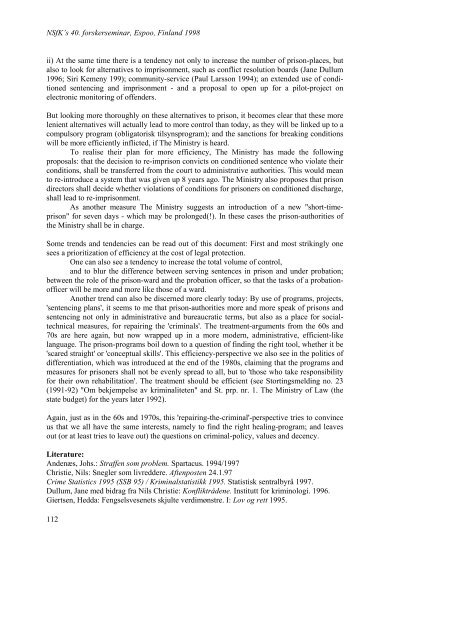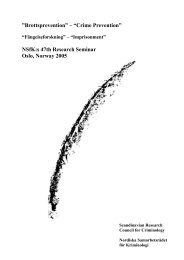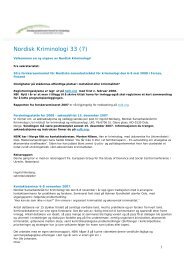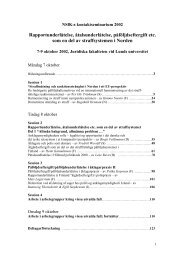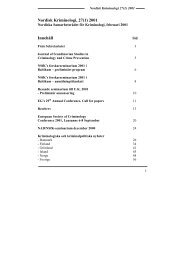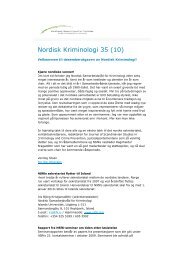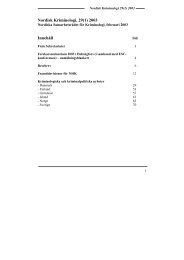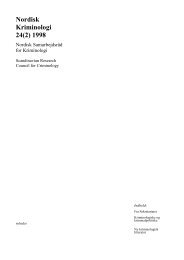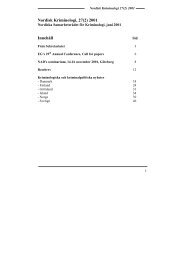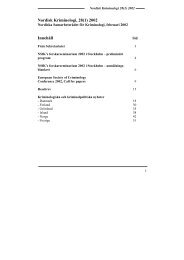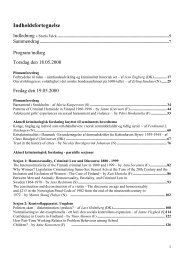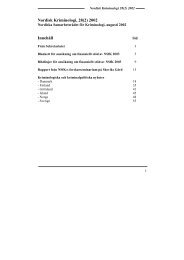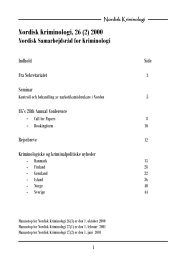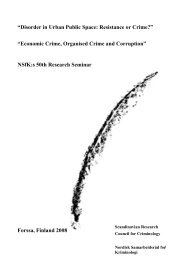Organised Crime & Crime Prevention - what works? - Scandinavian ...
Organised Crime & Crime Prevention - what works? - Scandinavian ...
Organised Crime & Crime Prevention - what works? - Scandinavian ...
You also want an ePaper? Increase the reach of your titles
YUMPU automatically turns print PDFs into web optimized ePapers that Google loves.
NSfK’s 40. forskerseminar, Espoo, Finland 1998<br />
ii) At the same time there is a tendency not only to increase the number of prison-places, but<br />
also to look for alternatives to imprisonment, such as conflict resolution boards (Jane Dullum<br />
1996; Siri Kemeny 199); community-service (Paul Larsson 1994); an extended use of conditioned<br />
sentencing and imprisonment - and a proposal to open up for a pilot-project on<br />
electronic monitoring of offenders.<br />
But looking more thoroughly on these alternatives to prison, it becomes clear that these more<br />
lenient alternatives will actually lead to more control than today, as they will be linked up to a<br />
compulsory program (obligatorisk tilsynsprogram); and the sanctions for breaking conditions<br />
will be more efficiently inflicted, if The Ministry is heard.<br />
To realise their plan for more efficiency, The Ministry has made the following<br />
proposals: that the decision to re-imprison convicts on conditioned sentence who violate their<br />
conditions, shall be transferred from the court to administrative authorities. This would mean<br />
to re-introduce a system that was given up 8 years ago. The Ministry also proposes that prison<br />
directors shall decide whether violations of conditions for prisoners on conditioned discharge,<br />
shall lead to re-imprisonment.<br />
As another measure The Ministry suggests an introduction of a new "short-timeprison"<br />
for seven days - which may be prolonged(!). In these cases the prison-authorities of<br />
the Ministry shall be in charge.<br />
Some trends and tendencies can be read out of this document: First and most strikingly one<br />
sees a prioritization of efficiency at the cost of legal protection.<br />
One can also see a tendency to increase the total volume of control,<br />
and to blur the difference between serving sentences in prison and under probation;<br />
between the role of the prison-ward and the probation officer, so that the tasks of a probationofficer<br />
will be more and more like those of a ward.<br />
Another trend can also be discerned more clearly today: By use of programs, projects,<br />
'sentencing plans', it seems to me that prison-authorities more and more speak of prisons and<br />
sentencing not only in administrative and bureaucratic terms, but also as a place for socialtechnical<br />
measures, for repairing the 'criminals'. The treatment-arguments from the 60s and<br />
70s are here again, but now wrapped up in a more modern, administrative, efficient-like<br />
language. The prison-programs boil down to a question of finding the right tool, whether it be<br />
'scared straight' or 'conceptual skills'. This efficiency-perspective we also see in the politics of<br />
differentiation, which was introduced at the end of the 1980s, claiming that the programs and<br />
measures for prisoners shall not be evenly spread to all, but to 'those who take responsibility<br />
for their own rehabilitation'. The treatment should be efficient (see Stortingsmelding no. 23<br />
(1991-92) "Om bekjempelse av kriminaliteten" and St. prp. nr. 1. The Ministry of Law (the<br />
state budget) for the years later 1992).<br />
Again, just as in the 60s and 1970s, this 'repairing-the-criminal'-perspective tries to convince<br />
us that we all have the same interests, namely to find the right healing-program; and leaves<br />
out (or at least tries to leave out) the questions on criminal-policy, values and decency.<br />
Literature:<br />
Andenæs, Johs.: Straffen som problem. Spartacus. 1994/1997<br />
Christie, Nils: Snegler som livreddere. Aftenposten 24.1.97<br />
<strong>Crime</strong> Statistics 1995 (SSB 95) / Kriminalstatistikk 1995. Statistisk sentralbyrå 1997.<br />
Dullum, Jane med bidrag fra Nils Christie: Konfliktrådene. Institutt for kriminologi. 1996.<br />
Giertsen, Hedda: Fengselsvesenets skjulte verdimønstre. I: Lov og rett 1995.<br />
112


